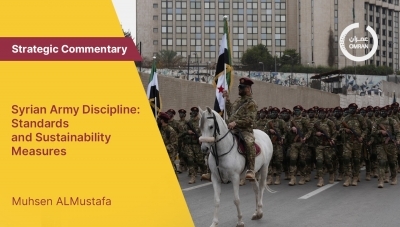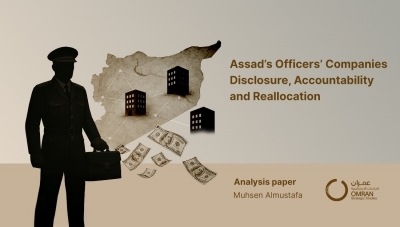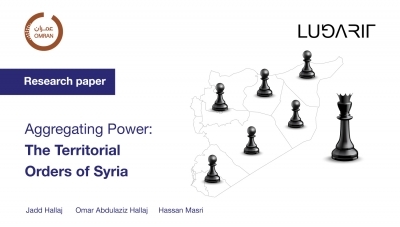Omran News
The Security Landscape in Syria and its Impact on the Return of Refugees An Opinion Survey
- Executive Summary
- The main goal of the study was to inspect factors influencing the return of Syrian refugees from neighboring countries. The study targeted all areas in Syria, including those controlled by the regime, opposition, and the Autonomous Administration (AA). Based on a wide and comprehensive sample, the data was then analyzed to explore the security situation, relations between citizen and state, as well as identify other causes that may be influencing the return of Syrian refugee.
- The study is based upon 620 surveys from Syrian refugees residing in Iraq, Lebanon, Jordan, and Turkey, as well as two Focus-Group Discussions (FGD) in regime-held Dara’a and Damascus Countryside.
- The study is divided into four components; 1) overview of the general security situation, 2) relations between civilians and security apparatuses, 3) factors affecting decision to return, and 4) the experience of refugee return to the particular regions. Each component is based on field research in each of the three uniquely controlled territories in Syria. A number of conclusions were assembled from the sample’s responses to the survey and within the FGDs.
- 1.The General Security Situation – An Overview
- The general security situation in Syria continues to be highly volatile and fragmented mirroring the political, military, and economic instability. To varying degrees, each area is experiencing a host of challenges revolving around the social and economic repercussions from the continued war.
- Based on responses from respondents residing in regime-held areas, the behavior of the security apparatuses affiliated with the Assad regime remains unchanged and persistent in utilizing the same detention and torture tactics as before 2011. The responses highlighted that the Assad-regime has even increased its brutality against civilians.
- The security apparatuses in regime, opposition, and AA held territories are unable to fully control the behavior of individuals, entities, and groups under their respective command at varying degrees. This is mainly due to lack of accountability and corruption.
- Lack of professionalism by security-affiliated officials in opposition-held territories has contributed to the deteriorating security situation.
- In Eastern Syria, within areas under the control of the AA, the security situation varies largely from city to city. While the AA is able to control the Al-Hasaka province, the security situation in Raqqa and Deir Ezzor is deteriorating.
- 2.Relations between Civilians and Security Apparatuses
- The relationship between civilians and security groups in all of Syria are significantly deteriorating. When comparing the three highlighted regions, the security apparatuses in regime-held territories is significantly affecting voluntary return of Syrian refugees from neighboring countries.
- Violations committed by regime security officials has reinforced public resentment, and exacerbated the negative perception of those security regime officials among citizens. The collective resentment and negative perception surrounding the regime’s security apparatuses, makes it difficult for reconciliation to occur in the future, as there is loss of trust and lack of reassurances between the community and the security apparatuses.
- It is apparent that the Assad regime’s security mechanism is no longer able to control the different military factions and militias. The inability to control armed groups has further ignited public wrath.
- In opposition-held areas, security groups are facing challenges in minimizing the influence of differing factions and in curbing their violations against civilians. Many of these factions refuse to abide by set rules.
- In all areas, citizens have little confidence that security apparatuses would address their complaints and believe they are biased in terms of arrests and complaint management.
- After 2011, regime security apparatuses relied increasingly on internal and external espionage networks by recruiting informants in all areas, across social classes and in countries hosting Syrian refugees. It is important to note that the Assad regime closely monitors returnees in areas in which the regime regained control.
- 3.Factors Affecting the Decision to Return
- With the deteriorating economic situation in Syria, access to a sustainable livelihood is among the most important factor considered by returnees. Other important factors that influence the decision to return included securing their property rights, accessing public services, and the prevalence of social and moral corruption.
- Seeking a voluntary and dignified return, Syrian participants highlighted the need for a UN-sponsored system that guarantees their security and safety upon return. Other push factors include: the level of services and living conditions, personal security, protection from discriminations, and legal/social stability experienced in host countries. All of these are significant factors that would influence their return.
- Most Syrian refugees attain information on the local situation through relatives and friends inside Syria, and is listed as their most relied upon source. This is followed by information from social media, international media outlets, and non-regime affiliated media outlets, as well as reports issued by civil society organizations or international organizations.
- The threat of facing arbitrary arrest by the Assad regime security, militias, and military factions was the most listed reason for delayed return among displaced Syrians. Fear of detention by the regime or other armed forces in Syria is followed by theft, abduction, and blackmailing for ransom. Other important considerations included local and foreign militias, the prevalence of assassinations, and random blasts.
- Displaced Syrians most at risk of arrest upon return to Assad regime-held areas are political activists, members of the Free Syrian Army, and members of opposition-military factions, defectors from the regime military, and those targeted for military conscription. This is followed by employees who defected from regime institutions, individuals from anti-regime areas, and businessmen respectively.
- 4.Refugee Return to Regions under various control
- For a large percentage of refugees, return to regime-held territories is difficult without international guarantees of safety. Even if refugees are able to return, services are selectively distributed based on regional demographics, Additionally, the regime’s security apparatuses would need to be reformed, which is close to impossible without structural changes in the country’s governance systems. The security apparatuses are closely linked to the Assad regime, which refuses any reforms or restructuring.
- Opposition-held territories are fragile and suffer from security infiltrations. The instability and lack of security largely affects the lives of civilians, as they live in fear of further situational decline. Absent of a comprehensive strategy and logistical capacity, the security forces in opposition-held territory are unable to guarantee safety and stability for civilians. The security situation within these areas is likely to continue deteriorating with the Assad regime’s agenda to advance and displacing more Syrians.
- AA-held territories suffering from pro-longed bureaucracies within the security apparatuses and wide-spread discriminatory practices including arbitrary arrest and protest suppression. This prevented a sense of stability within the AA regions. The lack of trust between communities and the AA’s security apparatuses reflects the instability of the areas. Additionally, there remain ISIS sleeper cells also contributing to security instability. These contributing factors prevent refugees from returning to their homes in AA territories.
- Introduction
Entering its tenth year, the Syrian conflict has resulted in a host of challenges for Syrian refugees in neighboring countries. The topic of return is among the most critical in local and international conversations, which remains a challenge with no solution in sight. Without a conducive political, social, and economically environment, voluntary return will be limited. A number of items must be considered to elevate the option of voluntary return, including securing a safe and dignified return, maintaining regional stability, and arranging the appropriate regional and international circumstances to ensure the availability of the objective conditions necessary for such return.
When discussing the internal factors in which effect the return of Syria’s displaced, the security situation is the most mentioned. The security conditions in all areas of Syria significantly influence an individual’s decision to return. With deteriorating security conditions, civilians are unable to feel safe and stable. With fear of being displaced again due to security reasons, they are deterred from voluntary return. With the ongoing crisis, maintaining a secure space remains difficult for security forces in opposition, Assad regime, and Autonomous Administration (AA) held territory. The path towards providing civilians with a sense of safety and stability there must be a political and military solution. Recovery and reconstruction may only begin when a safe environment is secured.
Omran Centre for Strategic Studies implemented a survey targeting individuals from regime, opposition, and AA-held territories. This survey is integral as it illustrates the perspective of civilians concerning the security situation and factors influencing their return. From the surveys, it is apparent that locally civilians understand the security conditions intensively, and are aware. The chaotic security situation -is manifested in a host of violations that come in different forms, tools, and intensities. Thus, it reflects the fragility and volatility of the security environment, which is inconsistent with the demand that international bodies seek to fulfil as one of the objective prerequisites for the safe and voluntary return of Syrian refugees from neighboring countries.
The goal of the survey was to identify primary and secondary factors as well as indicators related to the primary indicator of security stability in Syria. These secondary indicators include the efficiency of security apparatuses as well as the legal system associated with them, the performance of these apparatuses and their security operations in addition to relevant accountability, follow-up and complaints systems, as well as the extent to which these indicators have an impact on the return of the Syrian refugees from neighboring countries. First, the survey attempts to diagnose the general security landscape in various Syrian regions, then to identify the nature of relationships between civilians and security apparatuses in these areas, furthermore identifying the most important variables that govern the refugees' decision to return to Syria. Finally, it examines the reality of the refugees' return to Assad regime-held areas, opposition-held areas, and AA areas to determine the most important indicators related to the return of refugees to these areas.
For More Click Here: https://bit.ly/3gReLSU
Navvar Saban talking about a major problem for the Russians, especially in the southern of Syria
Navvar Saban "Oliver" at Omran for strategic Studies Military Expert and the Information Unit manager, recent interview entitled "Syrian refugees are unwelcome in the Israeli-occupied Golan Heights" by TRTWorld via lcmporter, in the article Saban talked the following points:
1- 1. Russia is pushing for reconciliation – they want people and fighters to stay in their cities
2- 2. They don’t want to create some kind of a gap that will be filled by Iran-backed militias.
3- 3. Whenever there is a gap because of evacuation, Iran-backed militias are expert now in filling this gap.
That is a major problem for the Russians right now, especially in the south.
Syrian Refugee Employment in Turkey
According to official statistics, the Turkish Republic hosts nearly 3.5 million Syrian refugees, more than any other country. A number of studies show that a vast majority of these refugees will remain in Turkey permanently, even if the situation in Syria becomes stable and return becomes a possibility. Despite this trend, however, government institutions and organizations have failed to establish a sustainable framework for integrating Syrian refugees into Turkish society. Although the Turkish government addresses some specific areas of need, many refugees must take responsibility for securing their own livelihoods. Due to a gradual decrease in international aid and the long-term presence of Syrians in Turkey, it has become more difficult for refugees to find suitable employment opportunities. Whereas issues of housing, education, health, and food are related to problems of capacity and bureaucracy, the issue of livelihoods is more closely linked to the legal framework and the perception of Syrian refugee employment among Turkish citizens. This problem is not only a humanitarian issue but a political one, both nationally and globally.
For Syrian refugees, employment is more than a job. It has a significant and sustainable impact on an individual’s life, future, and ability to integrate into a new society. Unemployment, however, is a significant problem in Turkey. Some estimates indicate that working-age people in Turkey account for more than 50 percent of the population, yet the unemployment rate exceeds 17 percent, according to the Livelihood Observatory. Moreover, in response to the influx of Syrian refugees in Turkey, an insufficient amount of funds has been allocated to livelihoods sector to enable Syrians to build their livelihoods in Turkey. According to the 2016-2017 plan of Syria's humanitarian response, the amount of funding available for the livelihoods sector was $11 million (USD), but the funding requirement was $92 million (USD). As a result, the Turkish government has faced significant challenges, creating employment opportunities for Syrian refugees, integrating and organizing refugees in the labor market, and addressing problems between refugees and their employers.
There are a number of obstacles that prevent Syrian refugees from developing their livelihoods. Most notably, legal procedures related to the employment of Syrian refugees lack clarity and integrity. In addition, there is poor communication between Syrian civil society organizations and the Turkish government, as well as a lack of representative bodies demanding employment rights for refugees.
Most Syrians live in Turkey under temporary protected status, which fails to ensure certain protections. In fact, Turkish labor laws that apply to Syrian refugees are inadequate and inefficient. Due to difficult financial conditions, refugees are vulnerable to exploitation, including unfair compensation. In addition, refugees performing physical labor at work face a higher risk of injury, yet some employers do not provide them with health or social insurance.
To overcome existing obstacles, all actors in the livelihoods sector should collaborate to create appropriate mechanisms that enable Syrian refugees to secure jobs and develop their livelihoods. Specifically, the Turkish government should create a database, accessible to all relevant parties, for Syrian employment opportunities and establish appropriate mechanisms to assess the qualifications of Syrian refugees. In addition, the government should implement vocational training programs for secured employment and establish a union for Syrian workers under the supervision of the Turkish Workers Syndicate. The government also should support Syrian refugee recruitment agencies and provide them with necessary funding and facilities. To support small business and micro-enterprisesfor Syrian refugees, government agencies should provide appropriate facilities. They also should facilitate banking and investment procedures for Syrians to expand their ventures and create new jobs, and they should utilize the financial resources and expertise of Syrians abroad in order to develop Syrian livelihoods in Turkey. In addition, the government should establish joint large-scale industrial projects connecting Syrian and Turkish investors.
Nongovernmental organizations (NGOs) should identify and develop mechanisms to sustain livelihood programs and ensure their growth. They should establish a cooperative fund to provide small grants to entrepreneurs, and they should conduct community awareness and education campaigns to inform Syrian refugees about their rights and responsibilities in the labor market. In addition, NGOs should establish programs to help at-risk refugees find employment opportunities. They also should create sustainable initiatives that enable coordination and cooperation between Syrian and Turkish employers. These programs should produce joint economic projects in all sectors and support vocational training and rehabilitation programs for Syrian refugees. In addition, these programs should ensure that Syrian refugees are not exploited due to legal status or physical condition.
With the significant and lasting presence of Syrian refugees in Turkey, temporary solutions are no longer viable, especially as more and more refugees enter the labor market. Unless concerned parties in the Turkish government work to develop sustainable solutions, refugees and their host communities will face serious problems, such as increased tension between refugees and the local population, as well as social and economic instability. On the other hand, the employment of refugees will benefit the Turkish workforce and economy, while ensuring a promising future for Syrians in Turkey.




